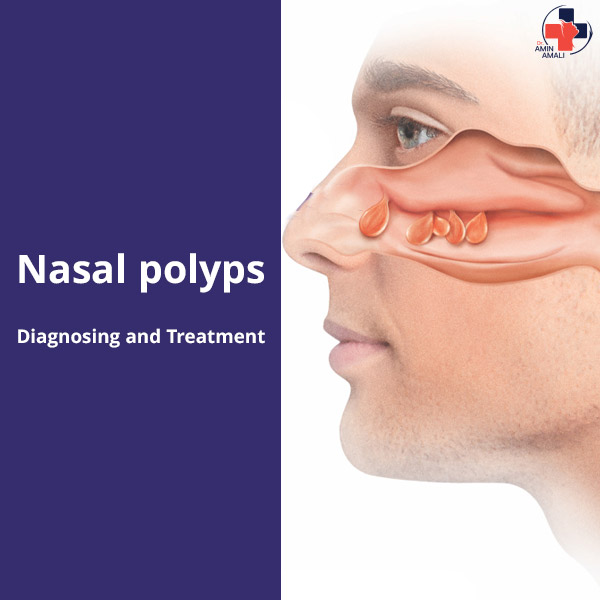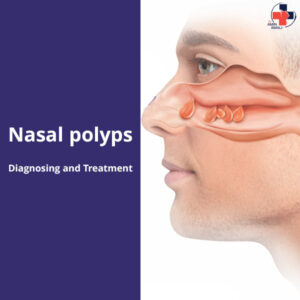Nasal polyps, those little growths you might not even know you have, can wreak havoc on your ability to breathe freely. These soft, painless bumps that form inside your nasal passages or sinuses can be a nuisance, but thankfully, they are treatable. Let’s delve into the world of nasal polyps, understanding their causes, symptoms, and available treatment options.

What are Nasal Polyps?
Imagine tiny, teardrop-shaped balloons inflating in your nose or sinuses. That’s essentially what nasal polyps are. They are benign (noncancerous) growths that develop on the lining of your nasal passages or sinuses. Often appearing on both sides of the nose, these growths can cause various bothersome symptoms.
Causes of Nasal Polyps
The exact reason why polyps develop remains a bit of a mystery. However, several factors are strongly linked to their formation:
- Chronic inflammation: Conditions like allergies or recurring sinus infections can irritate and inflame the lining of your nose and sinuses. This chronic inflammation is thought to play a role in polyp growth.
- Abnormal immune response: Some people may have an immune system overreaction that contributes to polyp formation.
- Sensitivity to aspirin and other NSAIDs (nonsteroidal anti-inflammatory drugs): This specific sensitivity can trigger polyp growth in some individuals.
- Certain medical conditions: Cystic fibrosis, a genetic disorder affecting the lungs and digestive system, and Churg-Strauss syndrome, a rare autoimmune disorder, are associated with an increased risk of nasal polyps.
Symptoms
Nasal polyps can be sneaky. Sometimes, they grow so small that you might not experience any symptoms at all. But as they increase in size, they can cause a variety of issues, including:
- Stuffy nose: This is a hallmark symptom of nasal polyps. Chronic congestion can make breathing through your nose difficult.
- Runny nose: Your body might produce extra mucus in response to the polyps, leading to a persistent runny nose.
- Postnasal drip: The excess mucus can drip down the back of your throat, causing an irritating tickle or cough.
- Loss of smell: Polyps can obstruct your nasal passages, hindering your ability to smell.
- Facial pressure or pain: Large polyps can put pressure on the sinuses, leading to facial pain or pressure, particularly around the forehead and cheeks.
- Sleep apnea: In severe cases, nasal polyps can contribute to sleep apnea, a condition where breathing repeatedly stops and starts during sleep.
Living with Nasal Polyps:
If you suspect you have polyps in your nose, it’s crucial to consult nose surgeon for proper diagnosis and treatment. Early intervention can help prevent complications and improve your quality of life.
Diagnosing
Diagnosis typically involves a physical examination of your nose and sinuses. Your doctor might use a special lighted instrument called an otoscope to examine your nasal passages. In some cases, imaging tests like CT scans might be needed to get a clearer view of the polyps and sinuses.
Treatment Options for Nasal Polyps:
The good news is that nasal polyps are treatable. Treatment options depend on the severity of your symptoms and the size of the polyps. Here’s an overview of some common approaches:
• Medications: Corticosteroid nasal sprays are the first line of defense. These sprays help reduce inflammation and shrink the polyps. Antihistamines might be prescribed if allergies are contributing to the problem.
• Nasal saline irrigation: Using a saline solution to irrigate your nasal passages can help loosen mucus and clear congestion.
• Surgery: If medication fails to provide relief, therapeutic nose surgery might be necessary to remove the polyps. This is typically an outpatient procedure with minimal recovery time.
Preventing Nasal Polyps:
While there’s no guaranteed way to prevent polyps, certain lifestyle practices might help:
- Manage allergies effectively: If you have allergies, following your doctor’s recommendations for allergy management can help reduce inflammation and potentially lower your risk of developing polyps.
- Avoid irritants: Smoke, dust, and other airborne irritants can worsen inflammation. Taking steps to minimize exposure to these triggers might be beneficial.
- Maintain good hygiene: Regular handwashing and practicing good nasal hygiene can help reduce the risk of infections that might contribute to polyp formation.
Nasal polyps might cause some frustration, but with proper diagnosis and treatment, you can breathe easier and reclaim your quality of life. Remember, early intervention is key. If you experience persistent nasal congestion, loss of smell, or other concerning symptoms, don’t hesitate to consult your doctor. With the right approach, you can manage nasal polyps and breathe freely once again.












